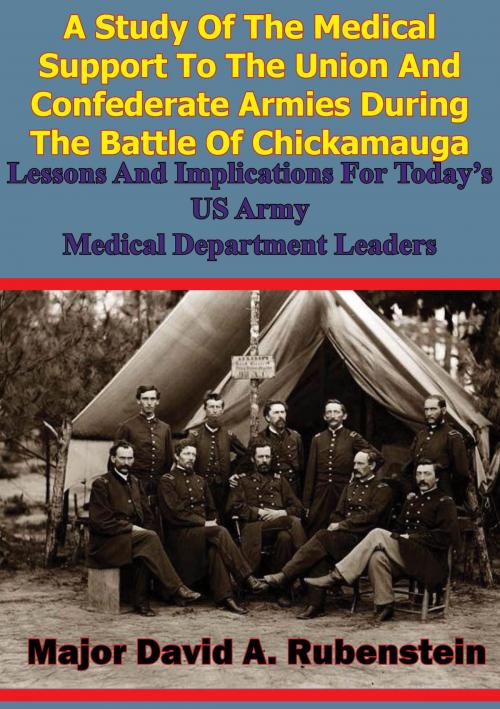A Study Of The Medical Support To The Union And Confederate Armies During The Battle Of Chickamauga:
Lessons And Implications For Today’s US Army Medical Department Leaders
Nonfiction, History, Modern, 19th Century, Americas, United States, Civil War Period (1850-1877), Military| Author: | Major David A. Rubenstein | ISBN: | 9781782896357 |
| Publisher: | Golden Springs Publishing | Publication: | August 15, 2014 |
| Imprint: | Golden Springs Publishing | Language: | English |
| Author: | Major David A. Rubenstein |
| ISBN: | 9781782896357 |
| Publisher: | Golden Springs Publishing |
| Publication: | August 15, 2014 |
| Imprint: | Golden Springs Publishing |
| Language: | English |
The Union’s Campaign for Chattanooga, Tennessee, and its resulting Battle of Chickamauga, is a valuable study of marked contrasts. On the one hand, brilliant strategic planning and operational maneuver, in concert with skillful deception, allowed the Union’s Army of the Cumberland to advance virtually unchallenged into the vital Southern city of Chattanooga on 9 September 1863. Following this drive into the gateway of Georgia and the Confederacy, however, was the Union defeat on the tactical battlefield just twelve miles to the southwest. Supporting each army was a medical support system grounded on the experiences and lessons of previous campaigns and battles. Both armies had medical leaders familiar with the medical organization, its recent accomplishments, and its capabilities. How these leaders applied the medical support doctrine of the era, within the scope of their duties, affected the lives of thousands of soldiers wounded on the Chickamauga battlefield.
The objective of this study is to examine the medical structures of both combatants, describe medical actions during the Chickamauga Campaign, from August to October 1863, and evaluate the effectiveness of each. As a result of this analysis appropriate implications are offered to the leadership of the Health Service Support system in the United States Army of 1990. Among the various implications discussed are the need for Health Service Support planning, tactical competence, staff cooperation, unity of command, and understanding of unique casualty care issues. The intended beneficiary of this historical analysis, and its suggested requirement of complete command support and dedicated medical training, is the very essence of an army: the soldier.
The Union’s Campaign for Chattanooga, Tennessee, and its resulting Battle of Chickamauga, is a valuable study of marked contrasts. On the one hand, brilliant strategic planning and operational maneuver, in concert with skillful deception, allowed the Union’s Army of the Cumberland to advance virtually unchallenged into the vital Southern city of Chattanooga on 9 September 1863. Following this drive into the gateway of Georgia and the Confederacy, however, was the Union defeat on the tactical battlefield just twelve miles to the southwest. Supporting each army was a medical support system grounded on the experiences and lessons of previous campaigns and battles. Both armies had medical leaders familiar with the medical organization, its recent accomplishments, and its capabilities. How these leaders applied the medical support doctrine of the era, within the scope of their duties, affected the lives of thousands of soldiers wounded on the Chickamauga battlefield.
The objective of this study is to examine the medical structures of both combatants, describe medical actions during the Chickamauga Campaign, from August to October 1863, and evaluate the effectiveness of each. As a result of this analysis appropriate implications are offered to the leadership of the Health Service Support system in the United States Army of 1990. Among the various implications discussed are the need for Health Service Support planning, tactical competence, staff cooperation, unity of command, and understanding of unique casualty care issues. The intended beneficiary of this historical analysis, and its suggested requirement of complete command support and dedicated medical training, is the very essence of an army: the soldier.







![Cover of the book Four Years Under Marse Robert [Illustrated Edition] by Major David A. Rubenstein](https://www.kuoky.com/images/2015/november/300x300/9781786251169-Rry8_300x.jpg)




![Cover of the book Reminiscences Of The Civil War [Illustrated Edition] by Major David A. Rubenstein](https://www.kuoky.com/images/2015/november/300x300/9781786251824-T47w_300x.jpg)


![Cover of the book The Civil War In The Western Theater 1862 [Illustrated Edition] by Major David A. Rubenstein](https://www.kuoky.com/images/2015/november/300x300/9781786254337-ymNQ_300x.jpg)